Different times trigger different concerns for Alberta voters
CBC
Sat, May 25, 2024
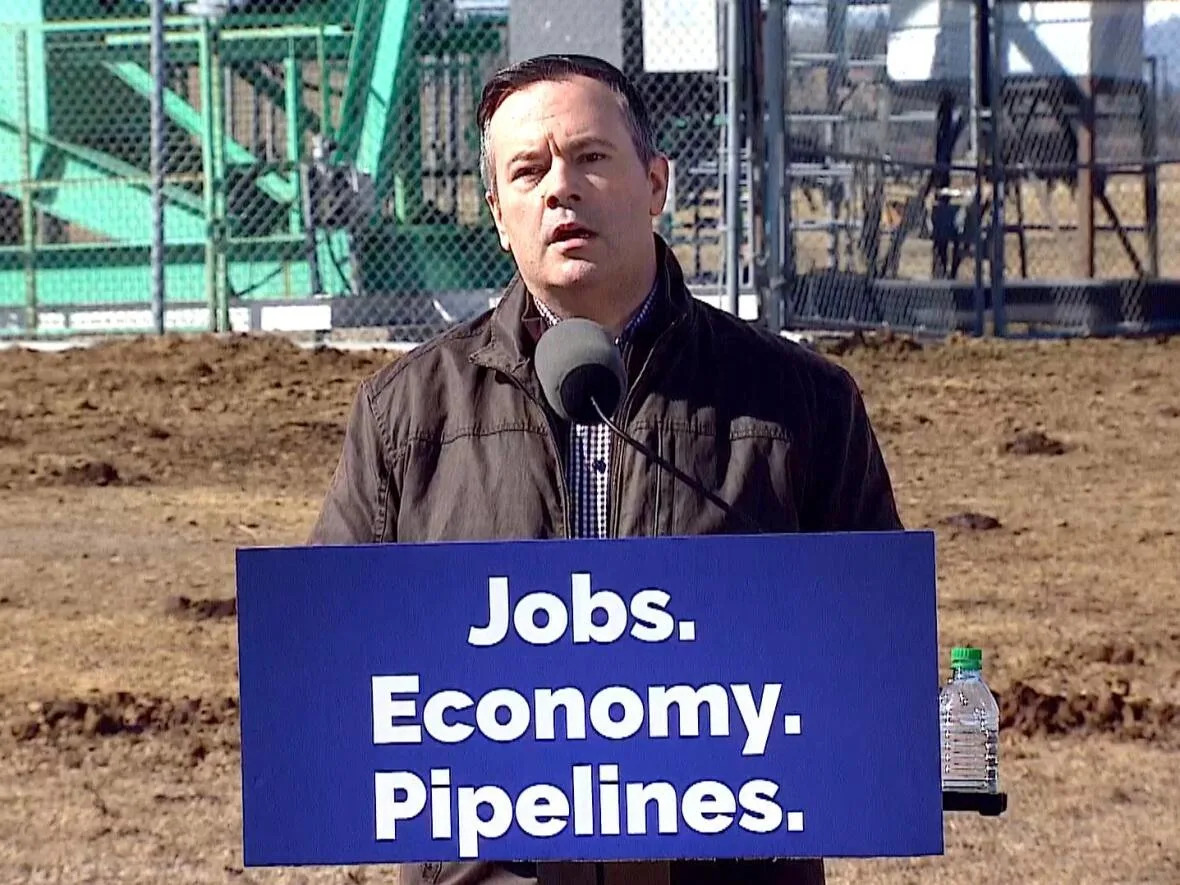
Jason Kenney campaigned in and won the 2019 election on three words: Jobs, Economy, and Pipelines. These days, Albertans seem much more concerned about the cost of living. (CBC - image credit)
EDITOR'S NOTE: CBC News commissioned this public opinion research in April, leading into the first anniversary of the United Conservative Party's general election win last May. The poll offers insight into how Albertans feel about Danielle Smith's UCP government and the Opposition NDP.
As with all polls, this one provides a snapshot in time.
This analysis is one in a series of articles from this research. More stories will follow.
Jason Kenney swept to victory in 2019 with a tightly focused message on what polls suggested Albertans cared most about.
"This election," he declared, squaring off against NDP premier Rachel Notley during the televised leaders' debate, "is about jobs, the economy, pipelines."
But, with the persistent pinch of inflation, a hot housing market, and wages seemingly not going as far as they used to, many Albertans appear more concerned about their personal microeconomics than the province's macroeconomics.
That's a change from last year, when health care topped the list of concerns, and five years ago, when Kenney relentlessly focused his political messaging on creating jobs, kick-starting Alberta's sluggish economy, and building pipelines to get the province's oil to tidewater.
"The public is reflecting on what's happening in their lives, what they're hearing on the news, what is happening around them. That's just the nature of public discourse. It's always changing," said Janet Brown, who conducted the survey for CBC News.
"Instead of talking about the economy and the strength of the economy, people are talking about inflation and cost of living. Their concerns about the economy have become way more personal," she stressed.
After concerns about the cost of living, three in 10 (32 per cent) picked health care as their top concern. Eighteen per cent mentioned housing as their most important issue. Albertans also give the governing United Conservative Party (UCP) poor grades for handling these three big problems.
Most Important Issues
Changing concerns with changing times
Think back to the lead-up to the 2019 election.
The hangover of the 2015 recession lingered. The employment rate had not rebounded to pre-recession levels.
The province's oil sold at record-level discounts — and concerns about pipeline capacity made headlines.
The price of Alberta oil was so low that the NDP government cut oil production by nearly nine per cent in January 2019 in hopes of boosting the price.
Despite this, there were more layoffs, and Alberta's economy contracted, even slipping into a mild recession late in 2019.
CBC News polling in 2018 — a year before the newly formed United Conservative Party (UCP) catapulted to power — found pipelines, jobs, and the economy were top of mind for Alberta voters.
Different times, however, come with other concerns.
Oil prices rebounded — and crude from the oilsands is flowing through an expanded Trans Mountain pipeline.
Only seven per cent of voters mentioned the energy sector in CBC News' recent poll, compared to four in 10 voters in 2018.
Most Important Issues Tracking
With headlines about labour shortages in Alberta, it's no surprise that unemployment mentions have dropped from 20 per cent in 2018 to a mere eight per cent in CBC News' latest poll.
Alberta's population also surged in the last year — and the provincial government is even offering tax credits, hoping to attract skilled workers.
While Alberta's economy is cooking with oil and gas again, a majority of people in the prairie province say they struggle to meet their monthly expenses. Recently, economist Jim Stanford, in a report released by the Alberta Federation of Labour, even warned that the so-called "Alberta Advantage" — surrounding wages and living standards — "is disappearing quickly for workers."
Albertans feel the pinch of rising costs. The province saw the largest, year-over-year increase in rental prices nationwide last month.
Not surprisingly, housing mentions jumped from a mere three per cent in 2018 to 18 per cent in the new poll.
Brown says people feel the squeeze of inflation, and that shows up in CBC News' recent survey.
"Today," said Brown, "we have a mix of concerns that are both economic and social. Back in 2018, people were almost exclusively focused on economic issues."
Cost of living different than economy
According to CBC News polling, concerns about the economy and health care traded places in Albertans' minds for the last six years.
Before last year's election — with lingering memories of a global pandemic still weighing on Albertans — health care was top of mind for Albertans, followed by inflation.
Brown stresses the economy and cost of living are different in voters' minds.
In people's minds, the economy is bigger than them. It is macroeconomic concerns such as taxes, investment, and overall job creation.
Albertans, says Brown, are not so much worried these days about whether they have a job — but "whether their job is going to give them enough money to afford their lifestyle."
"When people are talking about cost of living, they're talking about how this is really hitting them in their own pocketbook. Cost of living is a more personal response than I'm concerned about the economy," she added.
Notably, CBC News' poll suggests Albertans don't think the governing UCP is doing enough to contain inflation and housing costs.
UCP gets bad grades on Albertans' top issues
A year into its mandate, the governing UCP appears to have hung onto the support that propelled it to a majority last May.
Despite retaining most of their vote from the 2023 election, a plurality of Albertans disapprove of the governing UCP (52 per cent) compared to 44 per cent who approve.
While Albertans give the Smith's government good marks for being prepared for natural disasters and protecting the environment, the UCP got its worst grades — total disapproval scores above 60 per cent — for handling the three most important issues to Albertans.
Government Handling
More than six in 10 Albertans somewhat or strongly disapprove of the governing party's handling of health care, building affordable housing and dealing with the rising cost of living.
Duane Bratt, who teaches political science at Calgary's Mount Royal University, calls this a potential "big danger" for the government.
"The issues that are most important to Albertans are the ones where the UCP has very poor approval ratings," he said.
Bratt adds that the UCP cannot do much about inflation, as it's mainly driven by global markets and world events.
Despite that, provincial governments can feel the wrath of voters for things beyond their control.
"We reward governments in good times and punish governments in bad times, even though governments can only make changes on the margins," said Bratt.
The UCP's poor report card on inflation, housing and health care presents a potential opening for the opposition New Democrats.
When it comes to inflation, Brown suggests the NDP could score political points by talking more about it.
"I think there's an opportunity for the NDP to show that they're more sympathetic, more understanding, more empathetic of what the average Albertan is going through," said Brown.
Additionally, as the UCP restructures the province's health care system, the NDP — which first introduced universal medical care in the early 1960s in Saskatchewan — has another opportunity to shine.
"Voters have often seen the NDP as the party of social services and the UCP as the party of the economy," said Brown.
"There's definitely a weakness here as the government is on the verge of reworking its health care system. There's definitely an opportunity for the NDP to start talking about that issue."
But as this recent poll suggests, what's top of mind now can change — and the next election remains three years away.
The CBC News random survey of 1,200 Albertans was conducted using a hybrid method between May 1 and May 15 by Edmonton-based Trend Research under the direction of Janet Brown Opinion Research. The sample is representative of regional, age and gender factors. The margin of error is +/- 2.8 percentage points, 19 times out of 20. For subsets, the margin of error is larger.
The survey used a hybrid methodology that involved contacting survey respondents by telephone and giving them the option of completing the survey at that time, at another more convenient time, or receiving an email link and completing the survey online. Trend Research contacted people using a random list of numbers, consisting of 40 per cent landlines and 60 per cent cellphone numbers. Telephone numbers were dialed up to five times at five different times of day before another telephone number was added to the sample. The response rate among valid numbers (i.e. residential and personal) was 11.7 per cent.
CBC
Thu, May 23, 2024
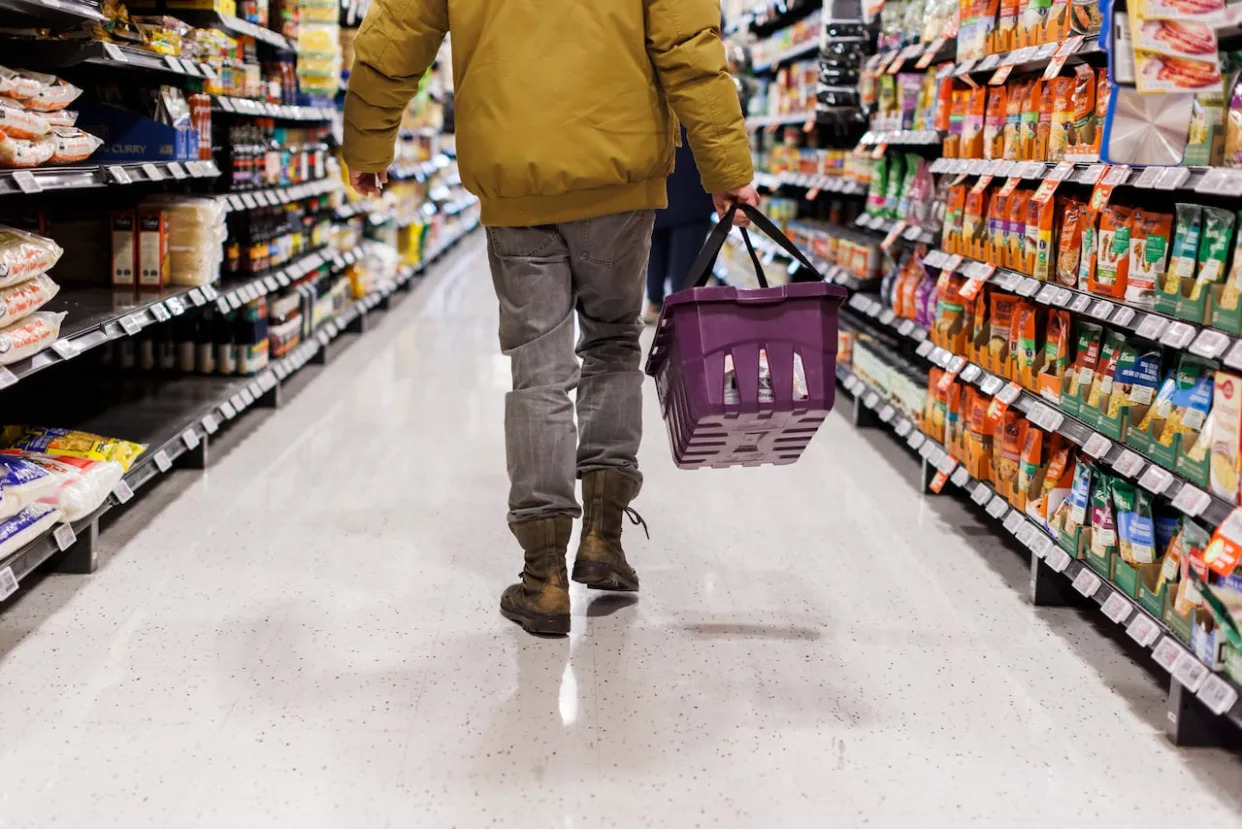
A customer browses a grocery store aisle in this file photo from February. (Cole Burston/The Canadian Press - image credit)
In a recent poll commissioned by CBC News, 54 per cent of Albertans said it's been difficult to meet their monthly household expenses — marking the first time that a majority of people have felt that way over six years of similar polling.
Pollster Janet Brown has been asking Albertans a variety of questions about their personal experiences and political preferences, as part of regular polling commissioned by CBC News since 2018.
"What really struck me about this poll were the economic numbers," she said.
"I know everybody likes to look at the political stuff, but this is a huge change. I don't usually see data change this dramatically year over year. This is not a flash in the pan. There has been a shift — an important shift — in the way people are feeling about the economy."
Albertans' political perspectives, by contrast, have not changed much over that same time.
Brown said the question about monthly expenses stands out against the rest of the poll results and represents a significant change over a relatively short period of time.
In this year's poll, which was conducted over the first two weeks of May, 37 per cent of respondents described it as "somewhat difficult" to pay their bills, and 17 per cent said it's "very difficult."
Previously, the largest rate of "very difficult" responses came in March 2020, when 12 per cent of Albertans felt that way.
"The other thing we do in the polls is we also look at the demographic information quite closely," Brown said.
"So it's not surprising that unemployed people, people with low incomes, are finding it difficult to meet their monthly expenses. But we saw some other interesting differences as well."
Some of the sub-groups of respondents who were most likely to be finding it difficult to meet their monthly expenses included:
Visible minorities (71 per cent).
Those who think the economy is getting worse (69 per cent).
Those who identify as centre or left on the political spectrum (67 per cent).
18- to 24-year-olds (67 per cent).
People living in rural central Alberta (64 per cent).
People with a high school education or less (63 per cent).
Parents with kids at home (63 per cent).
Edmontonians (58 per cent).
Women (57 per cent).
The differences by age are particularly stark, with a majority of those under 45 saying it's difficult to pay their monthly bills and a majority of those aged 45 and over saying it's easy.
Brown believes that's related to the cost of housing, which has been rising rapidly in Alberta amid the recent population boom.
"The older you are, the more likely you are to have your house paid off or just about paid off," she said.
"So age is definitely a predictor of how people feel, because the older you are, the more likely you are to have hard assets and be enjoying high house prices. The younger you are, the harder it is to get into the housing market."
Buying a home 'not really an option'
Wes Kyle counts himself as one of the luckier young people to be living and working in Calgary.
He graduated university with a degree in astrophysics in 2017 and remembers the struggle in trying to get established in a career at that time, when rents were cheaper and inflation was far lower.
"I was kind of sitting there being like, 'What can I do? How do I market myself?' And that was really, really hard and discouraging," he said.
"I can't imagine what it's like for like a 20-year-old trying to get established [today]."
Kyle eventually found his way into a career as a data scientist working in securities regulation. These days, he's among those who find it easy to meet their monthly expenses. But, Kyle said, he's been largely "insulated" from some of the inflationary factors affecting so many other people — most notably, rent.
"I'm in a one-bedroom in Victoria Park and I got it at $1,400 a month, and then it just increased this year to $1,500, which is much lower than the market rates right now," he said.
Even with a good career, Kyle said he's "basically written off" the idea of buying a home in Calgary.
"I've just kind of decided that I'm not going to sweat that," he said.
"It's not really an option for me with house prices."
Housing issues expected to persist
Mark Parsons, chief economist with ATB Financial, said inflation has started to ease across Canada, but Albertans are still being hit by increases in shelter costs due to some unique circumstances in this province.
"Alberta's getting a population driver that other provinces aren't — and that's interprovincial migration. More and more people are coming here to Alberta from other provinces, and that's putting extra pressure on the housing market," he said.
"It's rent and mortgage-interest costs that's really adding to overall inflation right now."
Brown noted there are two sides to the housing situation.
"Some people are really feeling the pinch; other people are quite enjoying the high price of their housing," she said.
"And so the political challenge for government is: How do you solve that problem for people who are finding it difficult to find adequate housing, but without penalizing the seniors who are actually relying on all of the equity they have in their house to fund their retirement?"
Brown also said she's cognizant that "people are struggling" is a common theme in the news but believes the latest polling results show something significant has changed among Albertans.
"Yes, there's always been an undercurrent of people who were having trouble," she said.
"But now, the people having trouble are in the majority. So this is new, because of just how drastically the numbers have changed in just a couple of short years."
"I think that's going to define our our politics going forward," she said.
The CBC News random survey of 1,200 Albertans was conducted using a hybrid method between May 1 and May 15 by Edmonton-based Trend Research under the direction of Janet Brown Opinion Research. The sample is representative of regional, age and gender factors. The margin of error is +/- 2.8 percentage points, 19 times out of 20. For subsets, the margin of error is larger.
The survey used a hybrid methodology that involved contacting survey respondents by telephone and giving them the option of completing the survey at that time, at another more convenient time, or receiving an email link and completing the survey online. Trend Research contacted people using a random list of numbers, consisting of 40 per cent landlines and 60 per cent cellphone numbers. Telephone numbers were dialled up to five times at five different times of day before another telephone number was added to the sample. The response rate among valid numbers (i.e., residential and personal) was 11.7 per cent.
Albertans think Danielle Smith is bad on affordability. Here's why she isn't paying for it
CBC
Sun, May 26, 2024
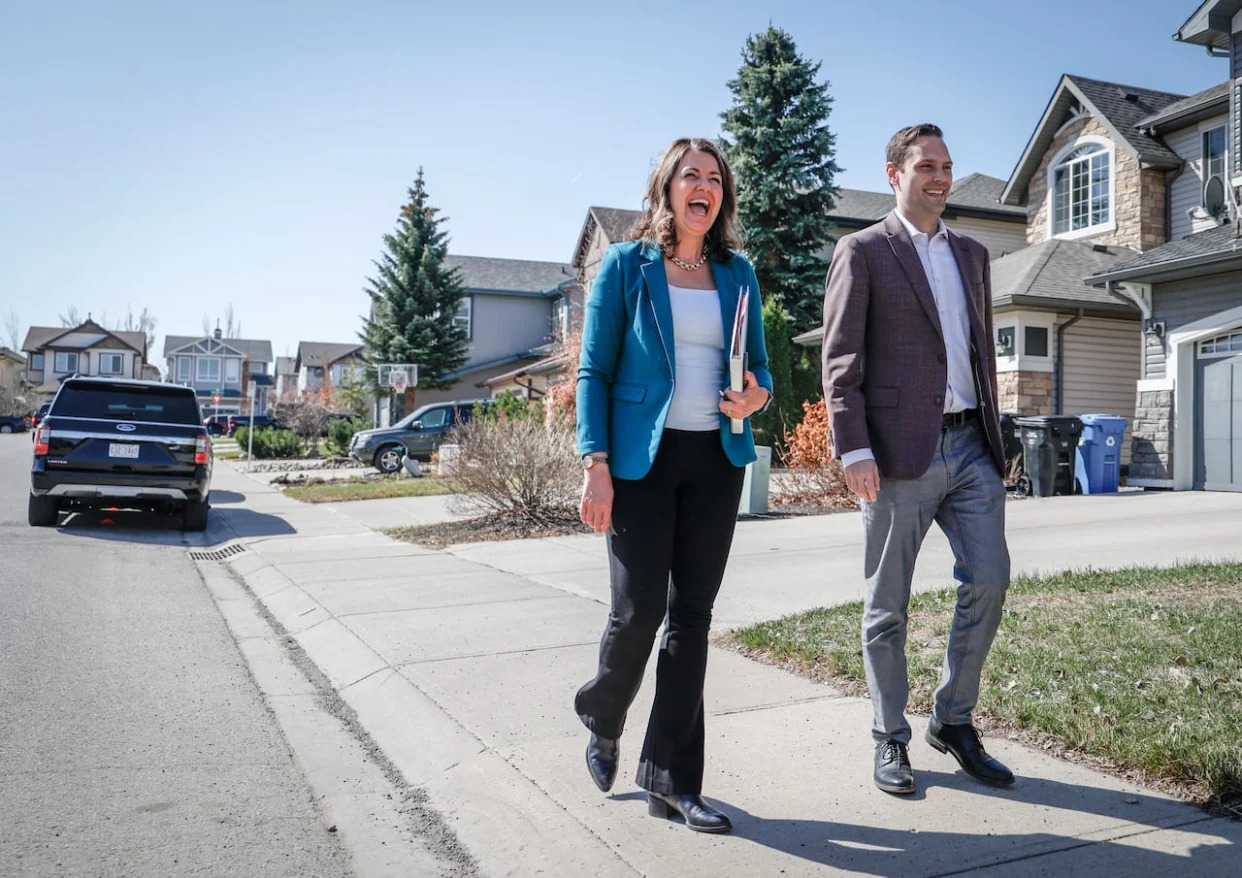
Premier Danielle Smith gets poor marks for her handling of key issues like cost of living and affordable housing. But that doesn't appear to be determining how Albertans feel about her government, new polling shows. (Jeff McIntosh/The Canadian Press - image credit)
EDITOR'S NOTE: CBC News commissioned this public opinion research in April, leading into the first anniversary of the United Conservative Party's general election win last May. The poll offers insight into how Albertans feel about Danielle Smith's UCP government and the Opposition NDP.
As with all polls, this one provides a snapshot in time. This analysis is one in a series of articles from this research.
The three most important issues to Albertans are health care, the cost of living and housing affordability — and fewer than one-third of Albertans think the provincial government is handling any of those files well, according to the latest batch of Janet Brown's polling for CBC News.
You might think these findings of public opinion ought to set off multiple fits of panic in Premier Danielle Smith's office. The big three issues, and they're all stinkers for the United Conservative government?
But Brown, arguably the most respected pollster in Alberta, has been doing this long enough to know how to dig into her own data to reach a less simplistic conclusion. She sees reasons why Team Smith probably won't be sweating the low scores on affordability or housing — yet — and flags other issues that could spell trouble for the premier against the Alberta NDP.
That deeper dive involves correlation analysis. (Please, don't throw your screen across the room or switch away to your word-puzzle app! I'll try my best to make sense of this! I'll even throw in a fast-food soda analogy!)
To really dig into which strengths and weaknesses the UCP (and its opposition) should sweat, Brown compared the government's approval rating on various issues to its overall approval rating. Does an Albertan's like or dislike of the UCP's handling of, say, the gender file drive its total impression of this government, or are people more likely to feel good or bad about the provincial handling of education regardless of how they feel about the UCP?
Then, Brown's team produces this chart:
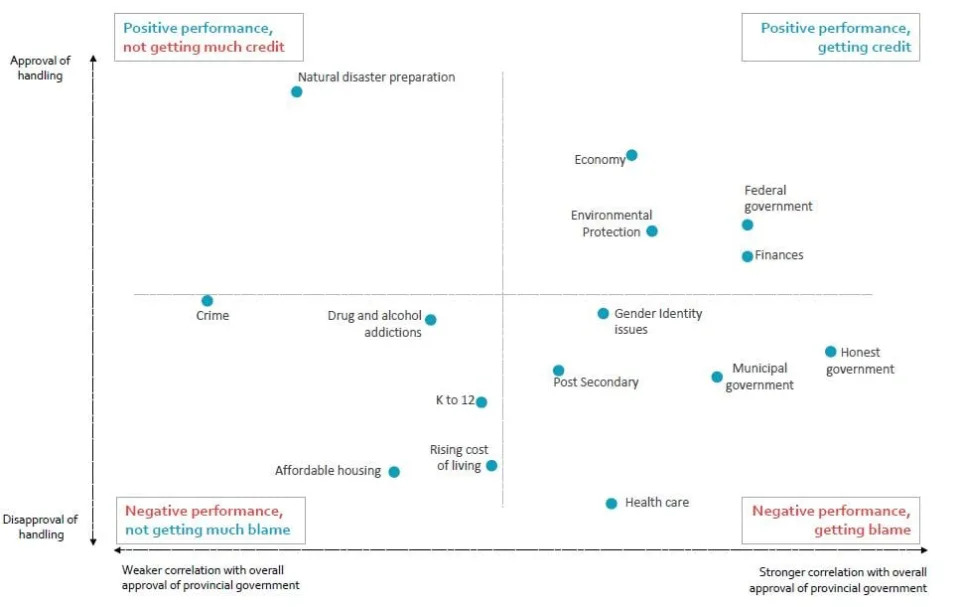
Mobile users: tap chart to zoom in (Janet Brown Opinion Research)
Clear yet? No? Fine.
Let me try a comparison that should be quicker than an early Sunday trip for drive-thru coffee.
In a past job, Brown did opinion research for a large fast-food chain. She produced a similar piece of analysis and chart for her corporate client.
For that restaurant, the issue that everybody seemed to support but it didn't drive people's overall impression (the top left corner of this chart) was its charitable donations — whoop-dee-doo, burger joint. Many disapproved of dirty bathrooms, but it wasn't a love-or-hate motivator for people (bottom left). This meant patrons expect untidy bathrooms, so at least they will keep eating there despite the ickiness.
The strong-suit issue that correlated with customer's support (top right) was hot and crispy fries — keep serving up those, and people would come back. What people disapproved of, and found to be a turn-off (bottom right), was how fizzy the soft drinks were. Based on this data, Brown recalls, the chain invested millions in better soda fountains to keep customers satisfied and their thirst quenched.
Red meat
Back to provincial politics.
This government's core strengths, its hot and crispy fries, would be its stewardship of the economy and finances, its climate and environment policies (or perhaps lack thereof) and especially its approach to the federal government. The public believes Smith is doing well in those areas, and they're getting noticed for it, and probably want to keep doing it to stay in Albertans' good books, Brown said.
The equivalent to the fast-food chain's charity works is the Alberta government's management of wildfires, floods and other natural disasters. The big meh.
Albertans are broadly satisfied, regardless of how they feel about the government — the UCP won't get much credit for doing a fine job, just like nobody really flocked to support the Rachel Notley NDP because of how well its administration responded to the Fort McMurray wildfire in 2016.
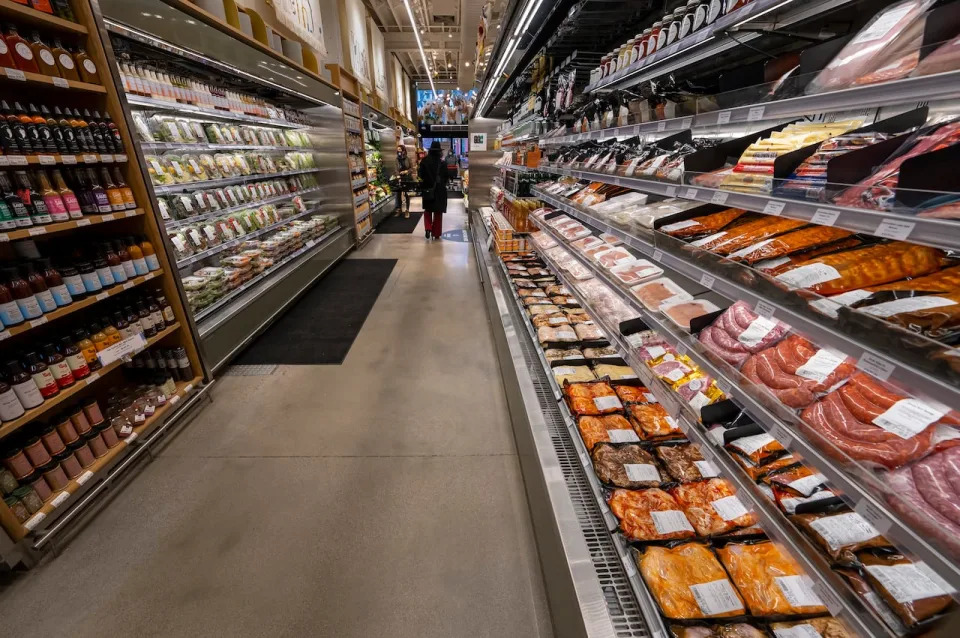
The Summerhill Market in Toronto on Wednesday February 2, 2022. The affordability argument against carbon pricing ignores some inconvenient facts.
For the first time in years, most Albertans say they're having trouble meeting their monthly expenses. And they don't believe the provincial government is really helping ease the cost of living. (Frank Gunn/The Canadian Press)
It's going to sound awkward comparing affordable housing to dirty fast-food bathrooms, but stay with me on this.
The issues in the bottom-left corner of Brown's chart, housing and cost of living, are not proving to be make-or-break issues for the Smith government, according to the pollster. They're areas of dissatisfaction, but they're not driving overall dissatisfaction with the UCP.
"It's not like the public is holding them to account on those," Brown said.
The traditional political observation has been that there's little a government can do to ease inflation or shift the real-estate market, and that voters often realize that.
Things appear different in 2024. Federal Conservative Leader Pierre Poilievre has consistently hammered Prime Minister Justin Trudeau on living costs and housing affordability — and it might have not only battered the federal Liberals' standing in polls, but it could have also meant Albertans are far less likely to blame these cost pressures on their provincial government.
While the last affordability cheques went out a year ago, and provincial fuel taxes have gone up from where they were a year ago, Smith doesn't appear to be ignoring the affordability files. The party continues to look at auto insurance reform, along with an overhaul of the electricity market.
Bad taste in their mouths
The issues in the last box are the ones that bode ill for the UCP, in the same way that burger chain had to get its fizzy-drink house in order to prevent losing customers. "If it's in the bottom right-hand box, these are things that matter to people, but they're not happy with the way governments manage them," Brown said.
While it's only really the naysayers that don't believe Smith's crew is providing honest government, ask former premiers Jason Kenney, Alison Redford or Jim Prentice how quickly the bottom can fall out on that measure.
Then there's how they deal with governments even closer to home. "It seems like the way they deal with the federal government, that's something they should continue because that's a strength for them," Brown said. "But the way they're dealing with the municipal governments — that matters to people, but people aren't nearly as happy with what they're doing in that area."
To ease tensions with mayors in big- and small-town Alberta, the Smith government has diluted the powers it sought to wield over municipalities. It appears it's not helping. So watch that space — a two-front provincial war with the feds and municipal councils may prove too much for voters to bear.
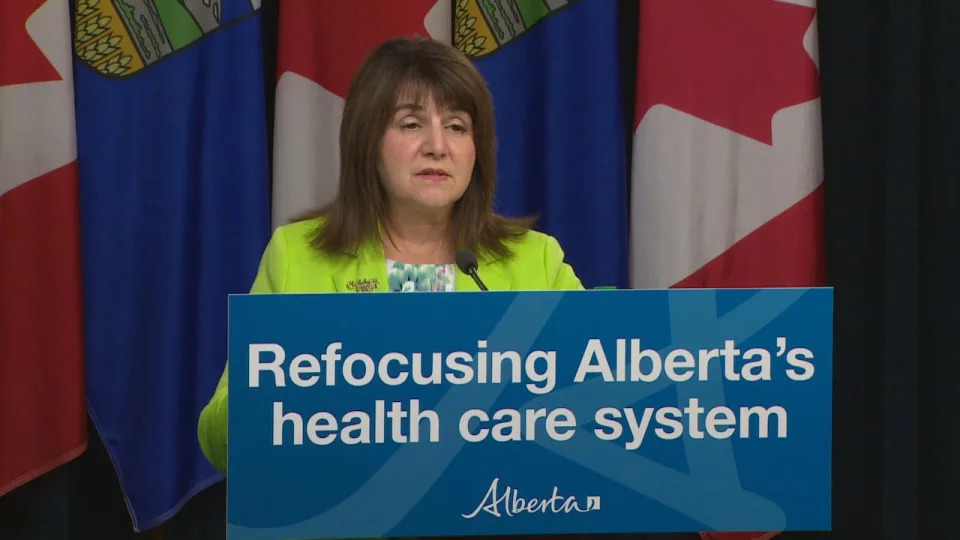
Health Minister Adriana LaGrange introduced Bill 22 in the legislature on Tuesday. The bill would break Alberta Health Services into four different organizations.
Premier Danielle Smith and Health Minister Adriana LaGrange have made breaking up Alberta Health Services into four agencies their key health-care reform measure. (Nathan Gross/CBC )
Then there's health care, which always has the potential to be an albatross around a premier's neck. Albertans think the government is mismanaging this crucial file, and it appears to be driving down the UCP's overall approval rating, according to Brown's polling.
Smith's dismantling of Alberta Health Services into four pieces appears to be her big idea for solving the system's various crunches and crises. Taxpayer-funded provincial TV ads now suggest the reorganization will somehow mean fewer patients in emergency-room waiting areas.
That whole move is a high-stakes gamble, designed to ease the public's drive to blame the UCP for what's ailing the health system. Smith will want to prevent it from falling as flat as non-fizzy cola.
The CBC News random survey of 1,200 Albertans was conducted using a hybrid method between May 1 and May 15 by Edmonton-based Trend Research under the direction of Janet Brown Opinion Research. The sample is representative of regional, age and gender factors. The margin of error is +/- 2.8 percentage points, 19 times out of 20. For subsets, the margin of error is larger.
The survey used a hybrid methodology that involved contacting survey respondents by telephone and giving them the option of completing the survey at that time, at another more convenient time, or receiving an email link and completing the survey online. Trend Research contacted people using a random list of numbers, consisting of 40 per cent landlines and 60 per cent cellphone numbers. Telephone numbers were dialed up to five times at five different times of day before another telephone number was added to the sample. The response rate among valid numbers (i.e. residential and personal) was 11.7 per cent.
CBC
Sun, May 26, 2024

Premier Danielle Smith gets poor marks for her handling of key issues like cost of living and affordable housing. But that doesn't appear to be determining how Albertans feel about her government, new polling shows. (Jeff McIntosh/The Canadian Press - image credit)
EDITOR'S NOTE: CBC News commissioned this public opinion research in April, leading into the first anniversary of the United Conservative Party's general election win last May. The poll offers insight into how Albertans feel about Danielle Smith's UCP government and the Opposition NDP.
As with all polls, this one provides a snapshot in time. This analysis is one in a series of articles from this research.
The three most important issues to Albertans are health care, the cost of living and housing affordability — and fewer than one-third of Albertans think the provincial government is handling any of those files well, according to the latest batch of Janet Brown's polling for CBC News.
You might think these findings of public opinion ought to set off multiple fits of panic in Premier Danielle Smith's office. The big three issues, and they're all stinkers for the United Conservative government?
But Brown, arguably the most respected pollster in Alberta, has been doing this long enough to know how to dig into her own data to reach a less simplistic conclusion. She sees reasons why Team Smith probably won't be sweating the low scores on affordability or housing — yet — and flags other issues that could spell trouble for the premier against the Alberta NDP.
That deeper dive involves correlation analysis. (Please, don't throw your screen across the room or switch away to your word-puzzle app! I'll try my best to make sense of this! I'll even throw in a fast-food soda analogy!)
To really dig into which strengths and weaknesses the UCP (and its opposition) should sweat, Brown compared the government's approval rating on various issues to its overall approval rating. Does an Albertan's like or dislike of the UCP's handling of, say, the gender file drive its total impression of this government, or are people more likely to feel good or bad about the provincial handling of education regardless of how they feel about the UCP?
Then, Brown's team produces this chart:

Mobile users: tap chart to zoom in (Janet Brown Opinion Research)
Clear yet? No? Fine.
Let me try a comparison that should be quicker than an early Sunday trip for drive-thru coffee.
In a past job, Brown did opinion research for a large fast-food chain. She produced a similar piece of analysis and chart for her corporate client.
For that restaurant, the issue that everybody seemed to support but it didn't drive people's overall impression (the top left corner of this chart) was its charitable donations — whoop-dee-doo, burger joint. Many disapproved of dirty bathrooms, but it wasn't a love-or-hate motivator for people (bottom left). This meant patrons expect untidy bathrooms, so at least they will keep eating there despite the ickiness.
The strong-suit issue that correlated with customer's support (top right) was hot and crispy fries — keep serving up those, and people would come back. What people disapproved of, and found to be a turn-off (bottom right), was how fizzy the soft drinks were. Based on this data, Brown recalls, the chain invested millions in better soda fountains to keep customers satisfied and their thirst quenched.
Red meat
Back to provincial politics.
This government's core strengths, its hot and crispy fries, would be its stewardship of the economy and finances, its climate and environment policies (or perhaps lack thereof) and especially its approach to the federal government. The public believes Smith is doing well in those areas, and they're getting noticed for it, and probably want to keep doing it to stay in Albertans' good books, Brown said.
The equivalent to the fast-food chain's charity works is the Alberta government's management of wildfires, floods and other natural disasters. The big meh.
Albertans are broadly satisfied, regardless of how they feel about the government — the UCP won't get much credit for doing a fine job, just like nobody really flocked to support the Rachel Notley NDP because of how well its administration responded to the Fort McMurray wildfire in 2016.

The Summerhill Market in Toronto on Wednesday February 2, 2022. The affordability argument against carbon pricing ignores some inconvenient facts.
For the first time in years, most Albertans say they're having trouble meeting their monthly expenses. And they don't believe the provincial government is really helping ease the cost of living. (Frank Gunn/The Canadian Press)
It's going to sound awkward comparing affordable housing to dirty fast-food bathrooms, but stay with me on this.
The issues in the bottom-left corner of Brown's chart, housing and cost of living, are not proving to be make-or-break issues for the Smith government, according to the pollster. They're areas of dissatisfaction, but they're not driving overall dissatisfaction with the UCP.
"It's not like the public is holding them to account on those," Brown said.
The traditional political observation has been that there's little a government can do to ease inflation or shift the real-estate market, and that voters often realize that.
Things appear different in 2024. Federal Conservative Leader Pierre Poilievre has consistently hammered Prime Minister Justin Trudeau on living costs and housing affordability — and it might have not only battered the federal Liberals' standing in polls, but it could have also meant Albertans are far less likely to blame these cost pressures on their provincial government.
While the last affordability cheques went out a year ago, and provincial fuel taxes have gone up from where they were a year ago, Smith doesn't appear to be ignoring the affordability files. The party continues to look at auto insurance reform, along with an overhaul of the electricity market.
Bad taste in their mouths
The issues in the last box are the ones that bode ill for the UCP, in the same way that burger chain had to get its fizzy-drink house in order to prevent losing customers. "If it's in the bottom right-hand box, these are things that matter to people, but they're not happy with the way governments manage them," Brown said.
While it's only really the naysayers that don't believe Smith's crew is providing honest government, ask former premiers Jason Kenney, Alison Redford or Jim Prentice how quickly the bottom can fall out on that measure.
Then there's how they deal with governments even closer to home. "It seems like the way they deal with the federal government, that's something they should continue because that's a strength for them," Brown said. "But the way they're dealing with the municipal governments — that matters to people, but people aren't nearly as happy with what they're doing in that area."
To ease tensions with mayors in big- and small-town Alberta, the Smith government has diluted the powers it sought to wield over municipalities. It appears it's not helping. So watch that space — a two-front provincial war with the feds and municipal councils may prove too much for voters to bear.

Health Minister Adriana LaGrange introduced Bill 22 in the legislature on Tuesday. The bill would break Alberta Health Services into four different organizations.
Premier Danielle Smith and Health Minister Adriana LaGrange have made breaking up Alberta Health Services into four agencies their key health-care reform measure. (Nathan Gross/CBC )
Then there's health care, which always has the potential to be an albatross around a premier's neck. Albertans think the government is mismanaging this crucial file, and it appears to be driving down the UCP's overall approval rating, according to Brown's polling.
Smith's dismantling of Alberta Health Services into four pieces appears to be her big idea for solving the system's various crunches and crises. Taxpayer-funded provincial TV ads now suggest the reorganization will somehow mean fewer patients in emergency-room waiting areas.
That whole move is a high-stakes gamble, designed to ease the public's drive to blame the UCP for what's ailing the health system. Smith will want to prevent it from falling as flat as non-fizzy cola.
The CBC News random survey of 1,200 Albertans was conducted using a hybrid method between May 1 and May 15 by Edmonton-based Trend Research under the direction of Janet Brown Opinion Research. The sample is representative of regional, age and gender factors. The margin of error is +/- 2.8 percentage points, 19 times out of 20. For subsets, the margin of error is larger.
The survey used a hybrid methodology that involved contacting survey respondents by telephone and giving them the option of completing the survey at that time, at another more convenient time, or receiving an email link and completing the survey online. Trend Research contacted people using a random list of numbers, consisting of 40 per cent landlines and 60 per cent cellphone numbers. Telephone numbers were dialed up to five times at five different times of day before another telephone number was added to the sample. The response rate among valid numbers (i.e. residential and personal) was 11.7 per cent.
No comments:
Post a Comment